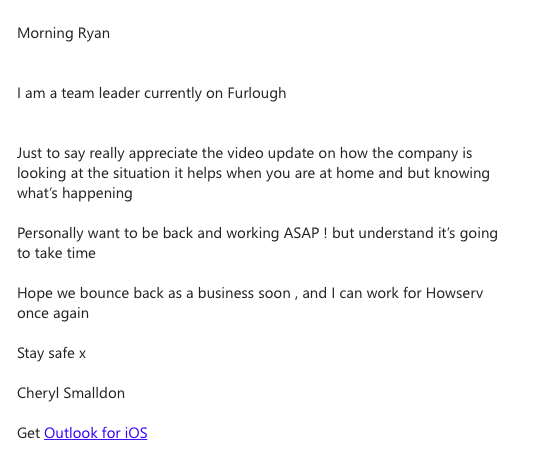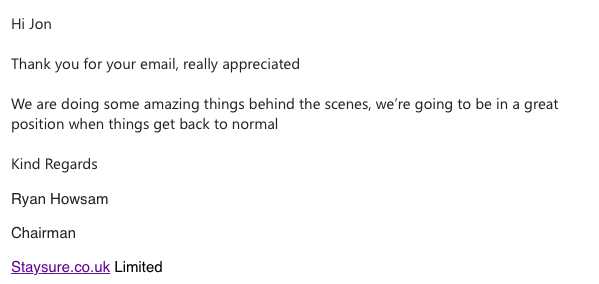THE EIS and SEIS Investment Schemes in the UK
5Select Premieres New Business Reality Programme
Why 90 Days works for goal setting
Further Investment in Holibob, Fast Growth Travel- Tech
Legends Tour 2022 Dates Announced
Pitching for investment: How to impress
Does asking for investment fill you with dread? Do you let your age or experience hold you back? How can you make sure you make the right impression when pitching for money?
I am often asked for advice from businesses seeking funding and how to handle objections from potential investors. Entrepreneurs tend to worry they are too young, too old or that they don’t have the right education or experience. In fact, it doesn’t matter how old you are, how long you have been in business or what your track record is (within reason). What matters to me is you, how you can demonstrate you have what it takes, how well you can articulate your vision, how good your idea or product is and if your business idea really makes sense. This is particularly important in the times we are living in with the changing landscape since Covid-19.
The Basics
The most important thing that I would say if you’re going to approach a private investor is firstly make sure that the business can be articulated in 30 seconds or less. And, secondly, that whatever vision you’re going after you have a team who can demonstrate the capabilities to be able to deliver on it. Do you fully understand the market that you’re going into and who the winners and losers are? Do you really understand how other companies have won in this space? How will you win? And finally, do you really understand the financials and have a business model that makes sense?
As an investor, there’s no way I’m going to pay an overvalued amount. Have you valued your business correctly? You need to think about how the investor can get ten times their money, to take into account that they are going to lose some.
You
Forget the business for a moment, are you a good investment? If I give you my money for your business, I am investing in you as well as the idea. I therefore always look for evidence of resilience, vision, and an ability to inspire others with charisma. Can you articulate your vision in a way that gets people excited? Does it get me excited? Positivity and decisiveness are also important qualities.
All these things are traits I look for in entrepreneurs and business founders, because they are incredibly important in business. Make sure you cultivate them if you want to be an entrepreneur!
So what can make someone stand out to an investor?
It’s hard to define what makes a founder stand out who is looking for money. There is often that intangible quality or spirit that shines through. But, one thing that really does stand out to me is if someone has had it tough. Someone who can bounce back and is resilient. Is this you? Maybe you’ve failed before. Don’t be afraid to share that: I don’t see a problem with people who have failed. In the USA it’s the norm but in the UK they seem to think if someone fails it’s bad and clearly it’s not. You can fail many times until you succeed. That being said, you should never fail the same way more than once.
Secondly, do you think big? I am looking for people who think big but who haven’t lost their marbles in doing so. For example, I heard from someone building a yoga platform the other day who said they were going to have a billion people using their platform. There are just under 8 billion people in the world, so really there is no chance! Whilst it is important to be ambitious you really have to sensor check your big thinking so there is actually some reality in there as well.
Is this your first Rodeo?
Some investors will look at opportunities from entrepreneurs without a track record and some won’t. If an idea is good enough and well thought through, then not having a track record doesn’t make a difference to me. But what does matter to me is that the people with the idea will have the ability to deliver it. You can have a great business idea, but with people that don’t know how to deliver it, it will fail.
The World is Changing- Are You?
Given we are in the middle of a pandemic, it’s also important to look at the current landscape and appetite for investment in different sectors. We don’t know how long it’s going to last and what long term effects it’s going to have. But, it’s highly likely that over a period of time it will disappear. Or it will become a run of the mill thing like the flu. Every business has to look at several scenarios. In a normal market, and a “new normal” market how will your business perform? Investors may now look at a business in relation to Covid. In other words how will this business perform in a Covid world? How can you demonstrate to your potential investor that you have a plan for different scenarios? This is incredibly important.
Do you know what you want?
Before you talk to an investor, it’s a good idea to be clear in your head what you are looking for. In terms of deal structures you’ll find that depending on who you’re pitching, some people will just buy straight equity. Straight equity basically means they are just paying for the stock. Larger companies will put in loan notes and they’ll charge, so be wary of that as a business owner. If someone is putting in loan notes what they tend to do is roll up and compound against you. So just be very wary there as you can have your equity or your value wiped out very quickly with loan notes.
Investors will be looking for some protection, in some cases this may be personal guarantees, although be wary of these, but they may want some form of security, or preference over the company should it go bust. Often investors will be looking for an exit depending on who they are, in 3-7 years. I’m a little bit different as I’m not looking for exits in the short term. If something’s good long term I’m going to stick with it and keep going.
If you are interested in investment and think you have the resilience and vision to impress, check out the application opportunities on my website here.
Think big when setting new year’s resolutions
Did you know that 99 percent of resolutions fail? I’m not surprised, as most people start with a vague goal like “lose a stone” or “save money” which isn’t exactly inspiring and it’s only a matter of time until the novelty of salad or spreadsheets wears off. So here we are in 2021, and this year more than ever it’s important to look ahead with positivity. The system I use, 90 Days, concentrates on the long term vision with targets for 90 days and the year ahead and can be used for any area of your life, not just business. I find this much more achievable than simply setting myself a new year’s resolution, and this system is so simple anyone can do it. Here’s how:
Start with your vision
What is your ultimate dream life? Having a strong, emotional connection to a vision you can see and imagine is much more powerful than simply trying to stick to rules. I write out what my ultimate life would look like in every area from relationships, to golf, to fitness to business. This is incredibly powerful, and doesn’t have to be time bound, you can use vision boards if you prefer or simply write it down. We tend to overestimate what we can achieve in a year and underestimate what we can achieve in 10, so dream big, don’t hold back!
Your goals for 2021
For 2021 you will need to set goals too, although I prefer the term outcome. An outcome is something you will achieve, a goal is something you may achieve. Choose one major and up to three minors, and write them down.
90 Days
Here is where the crucial part of my system comes in, choose your major and minor outcomes for the next 90 days. What are the most important things you have to achieve in the next 90 days to take you closer to your dream life? So, if you’re doing something that isn’t relevant to that, then ask yourself , why are you doing it?
Tasks
Next come tasks. I write my tasks out weekly and assign each one to one of my outcomes or life areas I am working on. If it doesn’t take me closer to my outcome it is not important.
As a typical entrepreneur with a million ideas a minute, focus has always been a struggle for me. Having a system that forces you to hone in on what’s important will prevent you veering off in different directions and help you make massive progress.
And it’s really that simple.
If this resonates with you, you can find out more on my website about my 90 Days programme. I’m also developing software to help businesses adopt this method themselves so watch this space. For now you can start with just the basic concepts above and you will be amazed at the progress you make.
I would love to hear how you get on.
Covid Business: Have you taken the tough decisions you need to?
Ask Powerful Questions and Get Powerful Answers– the biggest question you will need to ask yourself right now is have you really taken the tough decisions you need to, in order to protect the future of your company?
Right now as a business owner, you probably have a challenge on your hands, and you’re not alone. As far back as April, more than half a million UK businesses were reported to be in significant economic distress, and around a quarter ceased trading altogether temporarily. Now we are seeing some easing of lockdown measures, it doesn’t mean things will return to normal and bounce back immediately. In fact, we are expecting a long period of recession and economists don’t foresee us springing back quickly with a V shaped recovery. So, what does this mean for your business? I remain an eternal optimist and I know there is always a way to succeed. The key is not to panic but to take the time to ask yourself the right questions and to look at every area of your business.
Sometimes it is all too easy to put off making the tough decisions, but acting at the right time really can be the difference between make or break. Quite simply, you can get to profit two ways, increasing income or reducing costs. Look at every cost line, if it’s not needed now, get rid of it, the only exception being if it massively impacts your business when volume returns. If so, find a way to put the cost on hold.
This is where negotiation comes in. You would be surprised at how, in the current climate you can renegotiate existing contracts and deals, as your suppliers are in a different position. Where you can put off costs, you must do so now. Have you really been through every cost line and challenged both on the amount you are paying and the payment terms?
Right sizing your organisation- the biggest tough decision.
Getting your staff planning right is essential at any time. Given the furloughing scheme, I believe most employers are doing the humane thing and furloughing staff but it doesn’t stop there. You will have to remodel your business and account for several scenarios. How many staff will you need for each one? If you really don’t need them any more and you cannot afford them, you will have to make the tough choice of letting them go. This needs to be balanced carefully with long term pain of course; recruiting is much more expensive in the long run than keeping on good people, as long as they are needed.
How a reset could be a good thing for your business
Economists say we will not have a V shaped recovery. It is going to take businesses and consumers a while to bounce back. But, a reset is not always a bad thing. Taking stock and analysing your processes through the whole business can bring about new ideas, cost savings and efficiencies.
So what should you do now?
The three most important pieces of advice I can give to any company on the road through the coronavirus recovery are
- Don’t forget to be there for the customers you can still get
- Develop new ways to standout from the crowd with your proposition, service and offers
- Hit the reset button: Take stock of all areas of your business, looking at your processes. Fresh eyes will make you surprised to see what you didn’t before.
Do Not Stop Marketing
I’m amazed to see companies literally giving up, turning off their marketing spend when there is still demand there. If people are actively looking for your product, even in a downturn, let them find you. It sounds simple, but surprisingly I have seen many companies taking a blanket approach turning all marketing off. While some cut backs may be needed, if you do have channels that are paid for on results then you can still go for it. For instance with pay per click marketing, if people are still searching for your product, even if there are less searches, then it’s a no brainer to keep appearing for the smaller pot of people who still want your product.
Develop your Standout
The biggest thing now for any company in this world where it is harder to get the consumer as there is less money flowing is understanding that you really have to get your proposition, price and offer right for the market.
You may have to work a little harder but then when you do, the rewards will be higher. The market and world has changed. It is likely you won’t be able to continue exactly the same as you were, and the winners will be those who stand out. You can develop better products, better services or ideally both and you will need to reconsider the changing behaviour of customers too.
Reset: Your chance to take stock and improve your processes
Sometimes a reset is not a bad thing, looking at every process of your business is a great thing to do. When you really look at your processes properly it’s amazing how much you can save, in both time and money. For example I’ve completely overhauled the way we measure and report on operational efficiency with call handling in my business.
While trying to reduce the average call handling time but also driving more sales to the website, we realised that customers who do need to come through the contact centre need more time, but generally buy higher cost products. So even though the average handling time goes up, we get more from it. Looking at our operational efficiency using the average handling time metric, which we had done since day dot, turned out to be misleading. Now we are looking at margin per minute, measuring true value from the calls we get.
Just because a process has always been in place in your business doesn’t mean it makes sense. Take a fresh pair of eyes and go through all areas of your business.
Focus and Vision
To get out of the downturn, you need a clear vision that brings you and your team together, heading in the right direction. Having a vision is always important but now is the time to take a fresh look at where you are headed. Does it still make sense? And, once you have redefined your vision, you need to make sure every employee knows about it too. After Covid 19, ask yourself, how and where do I need to change my focus?
In order to work towards my vision and bring my teams on board with it, I use OKRs. These are objectives and key results, which are measured quarterly in cycles of 90 days. There is visibility at all levels of the company vision and OKRs so each employee can see how their role fits into the greater collective goals. The system puts the onus on the individual to set his or her own targets and to have stretch targets too. Managers are empowered to report upwards when something is off track. This has been so transformative to my companies that I’ve seen massive change.
Now more than ever, I strongly recommend using this approach to bring teams on board and ensure fantastic performance.
Is the car industry falling asleep at the wheel while Tesla drives forward?
In April 2020, more Tesla vehicles were sold in the UK than any other make. The figures of car sales overall are still low due to the coronavirus pandemic, but electric vehicles took 34% of the market share last month. That’s impressive..
Other car manufacturers have a serious threat from Tesla, but this could happen in any industry. It pays not to be complacent.
You have to stay ahead of the curve, or be left behind.
The perfect example is Blockbuster and Netflix. As early as 2000, Reed Hastings (CEO of Netflix) approached former Blockbuster CEO John Antioco and asked for $50 million for the firm. What a missed opportunity! Simply sticking their heads in the sand thinking streaming would never replace video rental was not a smart move. Don’t be the next Blockbuster, ensure you are embracing the changes and disruptions in your own industry.
Elon Musk has always been a visionary, originally misunderstood, when he wanted to buy a ballistic missile from Russia to create rockets they laughed at him so he built it himself. Now Nasa use him to put thousands of rockets into orbit for satellites. This is true visionary behaviour. With Tesla, he saw where a car could be and he pushed to get the battery and car technology so good that now he supplies tech to these other motor companies. This is a smart move, so he now plays a huge part across the whole eco system.
If Musk wants to change something he is agile, and has used innovative ideas to help build not only Tesla but to propagate the use of electric cars in general. Tesla has 429 locations around the world, offers customers the ability to purchase and customise their model online and has its own network of Supercharger stations, places where drivers can fully charge their Tesla vehicles in about 30 minutes for free. This has all helped him to disrupt and change the market.
Where’s my market going? What is going to disrupt my industry?
These are the questions I would be asking myself right now. It pays to be one step ahead of the game, never be blinkered and assume things will stand still. Channel your inner Elon Musk.
Government loans and grants for UK businesses hit by #Covid19
You’re pivoting, you’re cost cutting, but the situation is still bleak; Grants, loans and subsidies could make or break your business right now. If you haven’t already, ensure you’re not missing a trick with a grant to help you get through the coronavirus pandemic. Loans can also be very helpful, as long as you understand the terms and fully analyse your expected performance post-lockdown. With any loan, always ensure the metrics make sense and do your homework before applying.
Grants
The government grants for companies hit by #Covid 19 are detailed here. You may also find local authorities, charities and organisations offer industry specific grants. A good place to look for these is Grantfinder
Self Employed: help for the Self Employed during Coronavirus
If you are self employed and have lost income, a taxable grant will be paid to the self-employed or partnerships, worth 80% of profits up to a cap of £2,500 per month.
Initially, this will be available for three months in one lump-sum payment, and will start to be paid from the beginning of June.
Small Business Grant Fund (SMGF)
Under the Small Business Grant Fund (SBGF) all eligible businesses in England in receipt of either Small Business Rates Relief (SBRR) or Rural Rates Relief (RRR) in the business rates system will be eligible for a payment of £10,000.
Find out more
Retail, Hospitality and Leisure Grand Fund (RHLGF)
| Under the Retail, Hospitality and Leisure Grant (RHLG) eligible businesses in England in receipt of the Expanded Retail Discount (which covers retail, hospitality and leisure) with a rateable value of less than £51,000 will be eligible for a cash grant of £10,000 or £25,000 per property. Eligible businesses in these sectors with a property that has a rateable value of up to and including £15,000 will receive a grant of £10,000. Eligible businesses in these sectors with a property that has a rateable value of over £15,000 and less than £51,000 will receive a grant of £25,000. Businesses with a rateable value of £51,000 or over are not eligible for this scheme. Businesses which are not ratepayers in the business rates system are not included in this scheme. Find out more |
Innovate UK Grant
Grants of up to £50,000 will be available to technology and research-focussed businesses to develop new ways of working and help build resilience in industries such as delivery services, food manufacturing, retail and transport, as well as support people at home in circumstances like those during the coronavirus outbreak.
Future Fund- convertible loan
The Future Fund will provide government loans to UK-based companies ranging from £125,000 to £5 million, subject to at least equal match funding from private investors.
The application process is investor-led. This means an investor, or lead investor of a group of investors, applies in connection with an eligible company. As a company you can still register your interest though the relevant pages on the uk.gov website.
Eligibility
You’re eligible if your business:
- is based in the UK
- can attract the equivalent match funding from third-party private investors and institutions
- has previously raised at least £250,000 in equity investment from third-party investors in the last 5 years
There are also eligibility criteria for investors.
Find out more about Future Fund
Loans
Loans on offer depend on your circumstances and I would always advise you analyse your cash flow fo the next 6-12 months, taking into account the current climate. How many customers can you serve in six months when social distancing measures continue? Do you need to add any element of a personal guarantee? Think carefully and take advice where needed. A loan could help tide you over, but just ensure it works for your evolving business too.
Here is more information on the loans on offer.
Bounce Back Loans
| Small firms will be able to take out interest free loans worth up to £50,000 under a new emergency micro-loans scheme. New “bounce-back” loans will be 100 per cent guaranteed by the Government.The Government will cover the interest on the loans for the first 12 months, with firms able to pay back the remaining balance over the next five years at “very low” interest rates. This scheme will help small and medium-sized businesses affected by coronavirus (COVID-19) to apply for loans of up to £50,000. Find out more |
Coronavirus Business Interruption Loan Scheme
The Coronavirus Business Interruption Loan Scheme (CBILS) supports small and medium-sized businesses, with an annual turnover of up to £45 million, to access loans, overdrafts, invoice finance and asset finance of up to £5 million for a period of up to 6 years.
The Government will also make a Business Interruption Payment to cover the first 12 months of interest payments and any lender-levied fees. This means smaller businesses will benefit from no upfront costs and lower initial repayments.
The government will provide lenders with a guarantee of 80% on each loan (subject to pre-lender cap on claims) to give lenders further confidence in continuing to provide finance to small and medium-sized businesses.
The scheme is delivered through commercial lenders, backed by the government-owned British Business Bank.
Large Business Interruption Loan Scheme
A government-backed loan scheme for large businesses affected by coronavirus for firms with a turnover of more than £45 million. As of 26th May, 2020, companies who qualify will now be able to apply for up to £200 million of finance, with certain restrictions. To apply, companies must choose a lender who is accredited by the scheme.
Furlough Scheme- New Bonuses for Staff Brought Back from Furlough announced
The Chancellor Rishi Sunak has revealed new “jobs retention bonus” of £1000 per retained employee in next stage of the coronavirus economic plan.
Confused about government support?
There is now a helpful support finder on the UK Gov website, follow this link to access.
Focus
Trying to stay focussed is my Achilles heel and I think many entrepreneurs are similar.
I’ve developed a unique 90 day approach, taking the best of what’s out there to keep a razor focus on the things that make a difference. Learn how to roll this down throughout your organisation for maximum impact.
Financials and KPIs
Imagine trying to fly a plane without understanding the instruments, don’t do that with your organisation.
Learn how to build financial reports and kpis which enable you to drive the business in a risk controlled way focussing on the information which will inform your decisions. I favour cash flow positive businesses. Learn how to build your business without the need of external investment
Your business
Is the juice worth the squeeze?
Learn how to do a deep analysis of your business to make sure it’s worth going after. Develop a strategy to own a space in the market and build a powerful go to market plan. Don’t be a dummy and limit your marketing, learn how to competitively outspend your competition and achieve incredible growth
Your team
Learn how to build an A player team.
The cost of getting the wrong people into your business is way more than the recruitment and training cost, these people need to be relied upon to drive your growth. Get this wrong and your business will fail. Learn how to delegate and hold people to account without constantly chasing for updates.
You- the entrepreneur
What’s your vision?
Do you know how much you need for your ultimate lifestyle? It always amazes me when people don’t know what they are aiming for, know where you’re going, it’s easier to get there
Saga- Too many suits making stupid decisions
Softbank’s strategy: Big stakes, poor risk assessment
Published, April 17th 2022
“Softbank’s strategy still lacks common business sense. The number one rule in investing: Don’t lose money”
With recent reports showing Softbank has made a loss of $12.5bn, it’s easy to see how, as many of the individual investments themselves have flawed business models. The overarching investment strategy is an interesting one:
- Softbank’s model is to over-invest and over-value
- This creates a leader and a marketplace, a self fulfilling prophecy, catapulting their investment companies to dominate.
- The model itself could be very profitable, however in my opinion some of their investments have not had sufficient risk assessment: WeWork and Uber being amongst the most alarming.
WeWork’s model is to take leases on buildings that other people own, and oversell the underlying desk space, which in theory makes more money than a typical rental return. Therefore, by not owning the underlying building they are in theory not taking the risk. The reality is, however, there are huge fixed costs which in a downturn they can’t cover. Tying themselves up to long term leases adds no balance sheet value.
When it comes to Uber, their model is more complicated and problematic than other sharing economy organisations like Airbnb: With Uber, there are multiple issues. In many cases there are cars to supply, in some cases help to buy cars, as well as political and legal minefields to overcome. Airbnb is also risky in terms of legal challenges, but it’s a case of the owner simply using an asset, without any fixed cost risk. What’s more, Airbnb is a global model but Uber is regional and easier to imitate.
In summary, Softbank’s “Beyond Carrier” strategy is to connect people, things and events through telecommunications. (www.softbank.com) This mission may be at the heart of their chosen investments, and arguably, propelling the growth of companies like Uber has created huge cultural and social changes through technology. Common business sense is still needed though: To me it seems the basics of risk assessment and business modelling have been neglected in some of Softbank’s more infamous investments.





